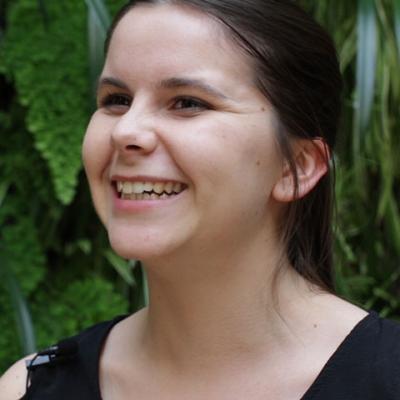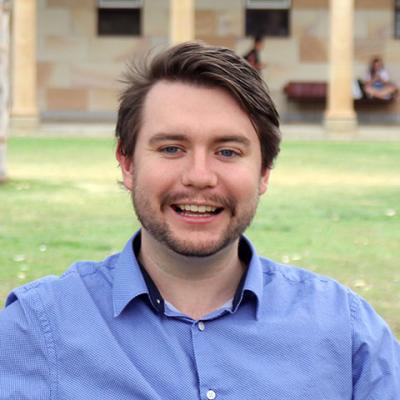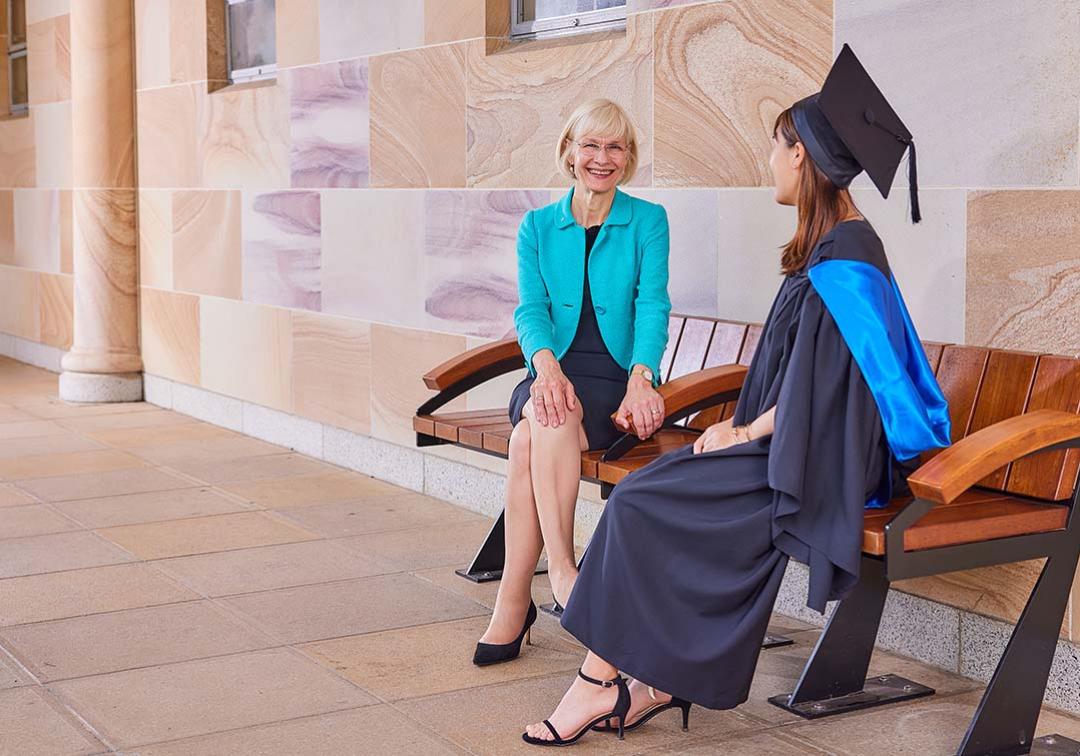
Bachelors of Arts / Education (Secondary)
Overview
Become a secondary school teacher with both teaching skills and specialist arts knowledge, and practise your skills in real classrooms.
This dual degree will give you a thorough understanding of the fundamentals of teaching secondary school, and specialist skills in the arts.
In the Bachelor of Education program, you'll combine university study with practical experience. You'll explore how to teach and how people learn, and study topics from 2 teaching areas. You'll then apply your knowledge in real classrooms.
Throughout the program you’ll be immersed in hands-on workshops, school visits and supervised placements, and gain a strong understanding of day-to-day life in a secondary school.
By combining your education training with a Bachelor of Arts, you'll gain both teaching skills and specialist subject knowledge.
With one of the most comprehensive course offerings in Australia, you'll have the opportunity to explore the subjects you love by choosing from study areas across the humanities, social sciences and languages, helping you build the portfolio of capabilities you need to become an expert teacher.
Program highlights
- Graduate with 2 degrees, as an expert in 2 teaching areas.
- Gain classroom experience, with placements available from early in your degree.
- Learn from world-renowned educators who’ll teach you flexible and creative ways to cater for the diverse learning needs of children and young adults.
- Choose from a wide range of study areas.
Majors
Tailor your studies to suit your goals. This program offers these options:
- Ancient History/History
- Chinese
- Chinese Translation and Interpreting
- Drama
How you'll learn
Your learning experiences are designed to best suit the learning outcomes of the courses you choose.
- Lectures
- Tutorials
- Work placements
- Overseas study
Placements and work experience
Students undertaking a Bachelor of Arts/Bachelor of Education (Secondary) dual program must complete a minimum of 80 days of supervised and assessed professional experience throughout the program.
Every effort is made to place students within a reasonable distance of their home base, but they can be expected to travel up to 90 minutes due to public transport connections and incur costs associated with travel and possible lost income over this period.
Students are generally placed at Ipswich, Brisbane, and southeast Queensland and are encouraged to explore the option of a rural placement. Financial assistance may be available to assist with travel and accommodation costs for rural placements.
Students are required to have a current Blue Card (Working with Children Check) before commencing practicum. Students can apply for a Blue Card through the School of Education and should do so three months before their practicum is due to commence. The Professional Experience Handbook for this program provides information about practicum and school experience requirements. Please visit the School of Education website to access required resources.
What you'll study
At UQ, degrees are called 'programs' and subjects are called 'courses'.
Career possibilities
Our programs prepare you for your first job and beyond. Depending on which major you choose, here are some of the careers you could be on your way to:
- Classroom music teacher
- Drama teacher
- English teacher
- Mathematics teacher
- French language teacher
- Legal education teacher
- Geography teacher
- Economics secondary school teacher
- Secondary school teacher
- History teacher
Next steps after graduation
You'll be eligible to apply for registration as a teacher with the Queensland College of Teachers, and to work as a secondary school teacher in state and independent schools in Australia and worldwide.
If you complete a major in music or a language (Chinese, French, German, Japanese or Spanish), you may also be able to teach in primary schools.
Further study and experience can lead to roles as a head of department, principal, guidance officer, learning support teacher, or student adviser.
Other graduates choose to work with non-school-based education providers (such as tutoring companies), government agencies or education advocacy organisations.
Professional memberships
When you graduate, you may be eligible for memberships with the following professional organisations. Contact the organisation to find out how to become a member.
- Queensland College of Teachers
Professional registration
When you graduate, you may be eligible for registration with the following professional organisations. Contact the organisation to find out how to register.
- Queensland College Of Teachers
Program accreditation
The Bachelors of Arts / Education (Secondary) is accredited by:
- Australian Institute For Teaching And School Leadership
Events
See all events
29 June
Voyages to the Underworld: UQ Centre for Western Civilisation Winter School
Stories
See all stories
UQ people
Dylan's PhD story: breathing new life into a living Indigenous language
4-minute read
Stories
See all stories
UQ people
How a UQ scholarship helped Paul pursue his dream
5-minute read

UQ people
Education without borders: Claudia’s vision for inclusive education starts at UQ
2-minute read
Entry requirements
Prerequisites
- General English subject (Units 3 & 4, C); and
- one of General Mathematics, Mathematical Methods or Specialist Mathematics (Units 3 & 4, C).
Prerequisites
- General English subject (Units 3 & 4, C); and
- one of General Mathematics, Mathematical Methods or Specialist Mathematics (Units 3 & 4, C).
Entry score threshold
| ATAR / Rank | IB |
|---|---|
| 75 | 28.25 |
These are the lowest adjusted scores we made an offer to in Semester 1, 2025. Entry scores are based on the most recent Semester 1 intake and are updated in April each year. Meeting the entry score threshold doesn't guarantee admission.
Guarantee your place at UQ: If you meet our guaranteed minimum ATAR you could secure an offer for your preferred program.
English language requirements
IELTS score of 7.5 overall; speaking 8; listening 8, reading 7, writing 7. For other English Language Proficiency Tests and Scores approved for UQ.
TOEFL iBT (Paper Edition), PTE Academic, BE, CES, and OET are not accepted.
There are other ways to meet the English language requirements. For some programs, additional conditions apply.
Inherent requirements
To complete this degree, you have to meet its inherent requirements by demonstrating essential skills and attributes. Read the inherent requirements before you apply.
Student visas
International students who are accepted into full-time study in the Bachelors of Arts / Education (Secondary) are eligible to apply for an Australian student visa (subclass 500).
There are a number of requirements you must satisfy before a visa is granted, including the Genuine Student (GS) requirement.
Entry score range
This table shows the range of entry scores for recent secondary students offered a place in the B Arts/B Education(Secondary) for Semester 1, 2025
| Without adjustments | With adjustments | |
|---|---|---|
| Highest | 97.45 | 99.85 |
| Median | 86.4 | 87.35 |
| Lowest | 70.9 | 75.15 |
Who you'll study with
Here's a snapshot of our student intake for this program in Semester 1, 2025:
| Applicant background | Number of students | Percentage of all students |
|---|---|---|
(A) Higher education study | 28 | 22% |
(B) Vocational Education and Training (VET) study | 5 | 3.9% |
(C) Work and life experience | <5 | <5 |
| (D) Recent secondary education | ||
| 82 | 64.6% |
| 0 | 0% |
| <5 | <5 |
International students | 10 | 7.9% |
Total | 127 | 100% |
"<5" — The number of students is less than 5.
N/A — Students not accepted in this category.
N/P — Not published. The number is hidden to protect the privacy of students in other cells.
Need help meeting the entry requirements?
Additional application information
All students are required to successfully meet the Literacy and Numeracy Test for Initial Teacher Education (LANTITE) standards prior to graduation. Please contact the School of Education for further details (education@uq.edu.au) or visit the School of Education office. For more information on the test including sample tests, indicative fees, testing institutions and registration information, please visit the School of Education LANTITE website and the Australian Council for Educational Research (ACER) website.
Additional application information
All students are required to successfully meet the Literacy and Numeracy Test for Initial Teacher Education (LANTITE) standards prior to graduation. Please contact the School of Education for further details (education@uq.edu.au) or visit the School of Education office. For more information on the test including sample tests, indicative fees, testing institutions and registration information, please visit the School of Education LANTITE website and the Australian Council for Educational Research (ACER) website.
Majors
Majors
Tailor your studies to suit your goals. This program offers these options:
Majors
Tailor your studies to suit your goals. This program offers these options:
Fees and Scholarships
Indicative annual fee
Approximate yearly cost of tuition (16 units). Your fees will vary according to your selected courses and study load. Fees are reviewed each year and may increase.
$10,925
2026
Approximate yearly cost of tuition (16 units). Your fees will vary according to your study load. Fees are reviewed each year and may increase.
AUD $45,792
2026
Additional costs
- There may be additional course costs associated with travel or materials.
- Students are expected to fund travel and living expenses associated with placements, some of which may be outside the Brisbane metropolitan area.
- All students are required to successfully meet the Literacy and Numeracy Test for Initial Teacher Education (LANTITE) standards prior to graduation.
- Students are responsible for the cost of the LANTITE (approximately $196 or $98 per test). ACER website (https://teacheredtest.acer.edu.au) lists current fees.
- Please contact the School of Education for further details (education@uq.edu.au) or visit the School of Education office.
- For more information on the LANTITE tests, including sample tests and registration information, please visit the Australian Council for Educational Research website: https://teacheredtest.acer.edu.au
- Students are responsible for the cost of transportation and accommodation to attend residential schools or practicals.
Government assistance
Financial aid
As an international student, you might be eligible for financial aid – either from your home country, or from the Australian Government.
HECS-HELP
Domestic places in the Bachelors of Arts / Education (Secondary) are Commonwealth supported, as long as you meet all Commonwealth supported place eligibility requirements.
This means the cost of your education is shared between you and the Australian Government. Instead of tuition fees, Commonwealth supported students pay what are called student contribution amounts.
If you have a Commonwealth supported place, you may also be eligible for HECS-HELP. This is an Australian Government loan scheme to assist eligible students with the cost of their student contribution amounts.
Centrelink support
The Australian Government offers a number of income-support payments to eligible Australian university students.
Scholarships
You may be eligible for more than 100 scholarships, including:
How to apply
Applying online
If your senior schooling is from outside Australia, you can submit your application to UQ. Or, if you prefer, you can use an approved UQ agent near you.
The program code for the Bachelors of Arts / Education (Secondary) is 2066.
How to apply for undergraduate study
If your senior schooling is from Australia
Submit your application to the Queensland Tertiary Admissions Centre if you're an international student who is currently studying:
- Australian Year 12 (in Australia or another country), or
- the International Baccalaureate in Australia.
The QTAC code for the Bachelors of Arts / Education (Secondary) is 707202.
Applying through QTAC
All domestic applications should be submitted to the Queensland Tertiary Admissions Centre (QTAC).
The QTAC code for the Bachelors of Arts / Education (Secondary) is 707202.
Important dates
If you’re studying Year 12 in Australia, go to the QTAC website to check the closing date for this program.
If you’re applying to UQ, the closing date for this program is:
- To commence study in semester 1 - November 30 of the previous year.
Visa processing times vary. Apply and accept your offer as early as you can.
To learn more about UQ dates, including semester start dates, view the Academic Calendar.
Important dates
To check the closing date for this program, go to the QTAC website.
To learn more about UQ dates, including semester start dates, view the Academic Calendar.
Admissions schemes
Applying to university can be both exciting and daunting, which is why we’ve tried to make the process as simple as we can.
We have several schemes in place to improve your chances of getting a place at UQ.
Pathway options
A rank or score doesn’t determine your potential.
If you're not offered a place in your first-choice program – or if you don't meet the entry requirements – you still have a number of options.
Aboriginal and Torres Strait Islander applicants
For support with applying – or if you have any questions about university life – get in touch with our Aboriginal and Torres Strait Islander Studies (ATSIS) Unit.
Explore other programs
Express yourself. And your interest.
They say choosing a degree is hard, which is why we've made it easy. Register your interest and we'll send you everything you need to know about applying to UQ.







